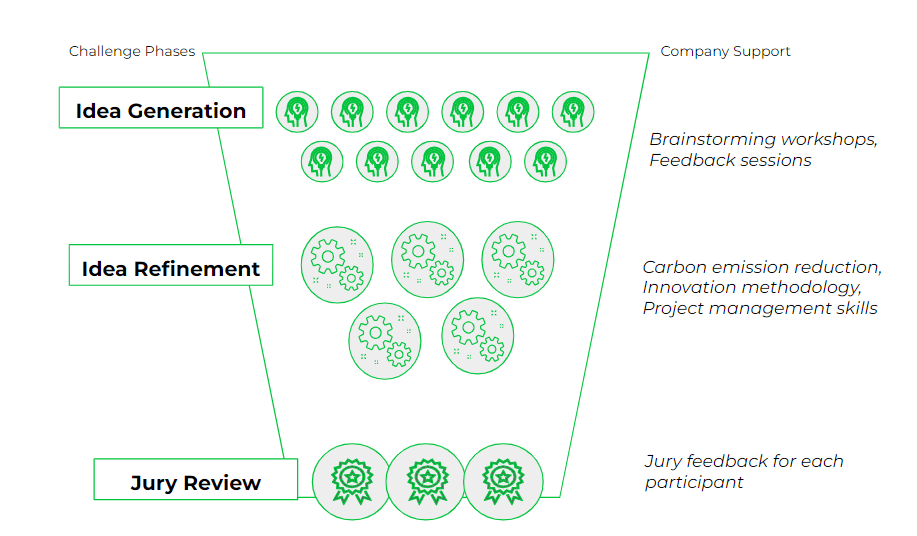At EcoVadis, we believe the private sector has a critical role in mitigating the impacts of the climate crisis. Pursuing our purpose to "guide all companies toward a sustainable world," we actively support our customers in expediting their decarbonization journeys through our products and solutions.
Being a trusted guide requires leading by example, and that's why we've set ambitious carbon reduction targets with the Science Based Targets initiative. Over the past few years, we've implemented a strong action plan and made significant progress toward our targets. Our ambitions remain high, and to stay on track through 2030, we’ve launched an Innovation Challenge to collect ideas and conduct effective change management across the business.
Why we launched an Innovation Challenge
Our purpose, “Guide all companies toward a sustainable world,” is bold, and so our goals are multifaceted. While reducing carbon emissions is a priority, we also strive for ambitious revenue growth and high employee and customer satisfaction. Achieving these targets simultaneously is a collective effort and a shared responsibility which requires us to rethink the way we do business.
We believe engaging all employees in this transformative journey is crucial for success. This is why we launched a collaborative innovation challenge—to invite every employee to become a change-maker in our carbon reduction journey and to give them the opportunity to shape the future of our business.
How It Worked
The innovation challenge was managed by our Innovation team in close collaboration with the Impact team, which is responsible for carbon management. The challenge was divided into three steps and ran for three months.
Phase 1 - GHG Education & Idea generation
In the first phase, we presented to employees the GHG footprint of EcoVadis including the main categories, trends, current actions and targets. Equipped with the knowledge they need to provide thoughtful proposals, employees were invited to submit their initial ideas. This stage was supported by brainstorming workshops and feedback sessions to encourage participants to think outside the box and generate creative ideas. And it worked: within the first two weeks, we received over 90 ideas!
Phase 2 - Idea Refinement
The second stage focused on refining the initial ideas. Participants did research, built business cases and worked on their pitches. In this stage we supported employees with knowledge sessions on carbon emissions and current reduction actions, along with workshops on innovation methodologies like the double diamond method, idea development and project management.
At the end of this stage 40 ideas were submitted to our expert jury.
Phase 3 - Jury Review
The submissions were reviewed by a jury of internal experts from the Human Resources, Technology, Carbon Solutions and Impact teams. The jury faced the tough task of selecting winners, ultimately naming three winners and multiple honorable mentions due to the high quality of the ideas.

Key Takeaway
You Don’t Need to Be a Carbon Expert to have an impact
This challenge revealed untapped potential within our workforce. Employees from various departments—IT, finance, office management and more—contributed fantastic ideas, proving that everyone can make a difference in decarbonization. This initiative inspired employees to think about carbon reduction in their own areas, creating a strong network of carbon ambassadors across the business. This engagement and creativity will be instrumental in achieving our reduction targets.
What’s Next?
When we launched the challenge our primary ambition was to turn ideas into action. That is why we immediately started working on idea implementation. The winning ideas are a mix of quick wins and long-term projects, allowing us to focus our attention on multiple projects at once.
Some quick wins, like improvements to our air travel emissions dashboard, have already been enacted. In parallel, we are engaging internal stakeholders to allocate resources to implement more long-term ideas in their departments.
And of course, we are actively exploring our winning idea, a long-term project still in its early stages.
At this point it is too soon to share our plans for implementing this idea but we will keep you updated on our progress—stay tuned!
About the Author
Follow on Twitter Follow on Linkedin Visit Website More Content by EcoVadis EN























